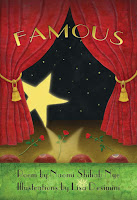Happy Spring! We’re halfway through poetry month, and you might be running short on poems!
Rasinski, Nichols, Rupley, Kellogg, & Paige (2018) remind us that poetry has many benefits for children’s literacy learning:
- Repeated readings of poems help children develop fluency and improve their word recognition.
- Children often like reading poetry because of how short the passages are, which makes them less intimidating.
- The rhythmic speech in poems expands children’s ways of using their imaginations.
- Additionally, children will start to understand familiar words and how rhymes work by seeing these repetition of words and language.
I went on a poetry hunt and found three poems for children (just in case you need some new awesome poems). All three can help expand children’s wordplay and word recognition, as well as strengthen their creativity and imagination.
Whenever you see a tree by Padama Venkatraman is a concrete poem, which expresses and expands creativity for students in their writing with the use of shape poetry. The poem reminds the audience that a tree is much more than a plant on earth, as it holds hope and history in its long life. Students will consider broad concepts like the importance of nature and the fragility of a single tree. As students read concrete poems, they become less intimidated by poetry because the shapes allow them to draw upon their visual understanding to inform their understanding of the text.
Famous by Naomi Shihab Nye emphasizes what is really important and beautiful in life. Nye shows how fame can be found in normal, everyday objects around us. She indicates how everything that is famous has a purpose, just like each and every one of us has. This free verse poem can indicate to students that poems can be written in many different styles, some of which allow them to break all the rules of poetry.My Doggy Ate My Essay by Darren Sardelli will show children just how fun poetry can be. He takes this expression, commonly used by students as an excuse for not having their homework, and creates it into poetry humor. Also, the incorporated rhymes throughout the poem, help children develop word recognition and wordplay.



Comments
Post a Comment